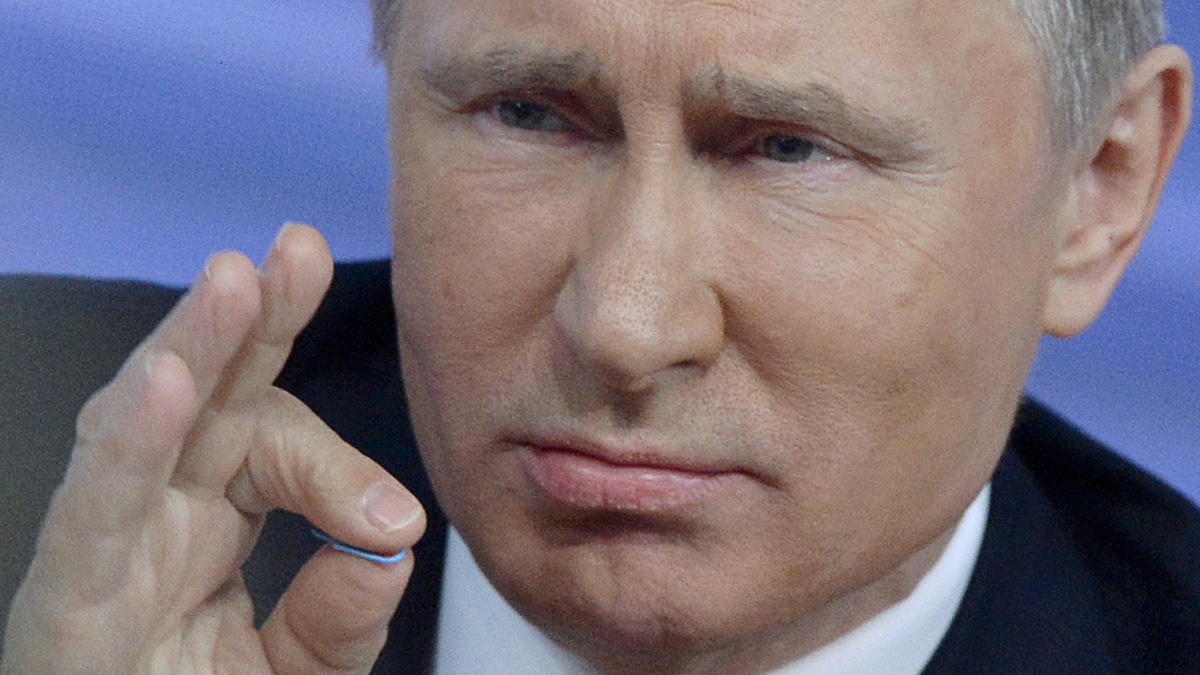Russia simulated nuclear attack on Sweden, says Nato
Military and intelligence units targeted in war game 'attack' that caught Swedes napping

A free daily email with the biggest news stories of the day – and the best features from TheWeek.com
You are now subscribed
Your newsletter sign-up was successful
Russia targeted Sweden in a simulated nuclear attack during exercises in 2013, Nato has confirmed, as worries about Moscow's military build-up continue.
The admission comes in the newly released annual report for 2015 from Nato's secretary general Jens Stoltenberg. The incident was reported in Sweden and further afield at the time but this is the first confirmation from the organisation.
"As part of its overall military build-up, the pace of Russia's military manoeuvres and drills have [sic] reached levels unseen since the height of the Cold War," Stoltenberg, a former prime minister of Norway, wrote.
The Week
Escape your echo chamber. Get the facts behind the news, plus analysis from multiple perspectives.

Sign up for The Week's Free Newsletters
From our morning news briefing to a weekly Good News Newsletter, get the best of The Week delivered directly to your inbox.
From our morning news briefing to a weekly Good News Newsletter, get the best of The Week delivered directly to your inbox.
"Over the past three years, Russia has conducted at least 18 large-scale snap exercises, some of which have involved more than 100,000 troops.
"These exercises include simulated nuclear attacks on Nato Allies (eg, ZAPAD [a large-scale Russian military exercise]) and on partners (eg March 2013 simulated attacks on Sweden)," he added.
According to the Daily Telegraph, the attack saw two Tupolev Tu-22M3 strategic bombers, escorted by four Sukhoi Su-27 jet fighters, cross the Gulf of Finland on 29 March.
The Russian planes came within 24 miles of Swedish territory off the island of Gotland, 100 miles from Stockholm. After apparently completing dummy bombing runs, the planes veered off to avoid violating Swedish air space.
A free daily email with the biggest news stories of the day – and the best features from TheWeek.com
Their "targets" are said to have included a military base in southern Sweden and the headquarters of the country's signals intelligence agency, which is outside Stockholm.
The incident caused controversy at the time, says the paper, because the Russians essentially caught the Swedes napping. They had no advance warning and no aircraft ready to scramble to monitor the incoming aircraft. Instead, they had to rely on Danish planes which shadowed the Russians.
Russia has not commented officially on the Nato claim but the Telegraph spoke to Evgeny Buzhinsky, a former general who now heads the Moscow-based PIR think tank, who said it was "nonsense designed to stir up hysteria about the Baltic states".
He added: "This statement about a supposed nuclear strike on Sweden is nothing more than a provocation."
Since Russia annexed Crimea from Ukraine two years ago, there have been fears it might use the presence of Russian-speaking minority groups in the Baltic states as an excuse to invade.
Buzhinsky told the Telegraph this was not going to happen, however, and that there would be no strategic advantage to taking control of Estonia, Latvia or Lithuania, nor were the Russian speakers there going to ask for "protection".
But he warned any increase of Nato's military presence in the region would be a "reason for concern from the Russian side" and would be met tit-for-tat.
-
 Political cartoons for February 19
Political cartoons for February 19Cartoons Thursday’s political cartoons include a suspicious package, a piece of the cake, and more
-
 The Gallivant: style and charm steps from Camber Sands
The Gallivant: style and charm steps from Camber SandsThe Week Recommends Nestled behind the dunes, this luxury hotel is a great place to hunker down and get cosy
-
 The President’s Cake: ‘sweet tragedy’ about a little girl on a baking mission in Iraq
The President’s Cake: ‘sweet tragedy’ about a little girl on a baking mission in IraqThe Week Recommends Charming debut from Hasan Hadi is filled with ‘vivid characters’
-
 Munich Security Conference: a showdown between Europe and Trump?
Munich Security Conference: a showdown between Europe and Trump?Today’s Big Question Report suggests European leaders believe they can no longer rely on the US for military support – but decoupling is easier said than done
-
 What is ‘Arctic Sentry’ and will it deter Russia and China?
What is ‘Arctic Sentry’ and will it deter Russia and China?Today’s Big Question Nato considers joint operation and intelligence sharing in Arctic region, in face of Trump’s threats to seize Greenland for ‘protection’
-
 New START: the final US-Russia nuclear treaty about to expire
New START: the final US-Russia nuclear treaty about to expireThe Explainer The last agreement between Washington and Moscow expires within weeks
-
 What would a UK deployment to Ukraine look like?
What would a UK deployment to Ukraine look like?Today's Big Question Security agreement commits British and French forces in event of ceasefire
-
 Would Europe defend Greenland from US aggression?
Would Europe defend Greenland from US aggression?Today’s Big Question ‘Mildness’ of EU pushback against Trump provocation ‘illustrates the bind Europe finds itself in’
-
 Did Trump just end the US-Europe alliance?
Did Trump just end the US-Europe alliance?Today's Big Question New US national security policy drops ‘grenade’ on Europe and should serve as ‘the mother of all wake-up calls’
-
 Is conscription the answer to Europe’s security woes?
Is conscription the answer to Europe’s security woes?Today's Big Question How best to boost troop numbers to deal with Russian threat is ‘prompting fierce and soul-searching debates’
-
 Trump peace deal: an offer Zelenskyy can’t refuse?
Trump peace deal: an offer Zelenskyy can’t refuse?Today’s Big Question ‘Unpalatable’ US plan may strengthen embattled Ukrainian president at home